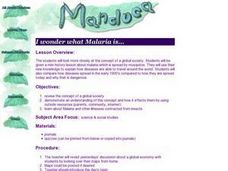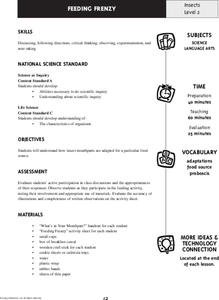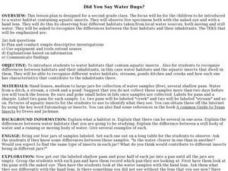Curated OER
I Wonder What Malaria is
Students examine the disease malaria. They compare how diseases were spread in the early 1900's compared to how they are spread today and discuss why that is dangerous. They take a survey to see how much they know about insects that...
Curated OER
Walking Magic
Students conduct experiment with water striders by placing the insect in two different solutions and discuss their observations. They discover that weight and surface area are important factors in their experiment.
Curated OER
Feeding Frenzy
Learners examine, through experimentation and simulation, how insect mouthparts are adapted for particular food sources, discuss how various animals have adapted to survive, play Feeding Frenzy game, and complete activity sheets.
Curated OER
Habitat Collage
Students explore habitats. In this science lesson, students discuss habitats and the insects that are found within each habitat. Students create a habitat collage.
Curated OER
Macroinvertebrate Mix and Match
Students are introduced to macroinvertebrates (primarily insects), the major segments of aquatic insects (the head, thorax and abdomen) and also differentiate between larval, nymph and adult stages. They investigate the head, thorax and...
Curated OER
Pop-Up Wildlife Mural
Students research life in a rainforest including plants, animals, insects, climate. They discover reasons for the importance of rainforests to the Earth's environment. Students work as a group to create a large 3-D rainforest scene that...
National Wildlife Federation
Habitat Web
Young scientists weave together an understanding of ecosystems with this fun collaborative activity. Taking on the roles of different living and non-living elements of specific habitats, learners use a ball of yarn to create the web of...
Howard Hughes Medical Institute
Tracking Genetically Modified Mosquitoes
What's that buzzing in your ear? An insightful lesson about genetically modified mosquitoes! Partnered pupils explore the creation, release, and monitoring of mosquitoes designed to reduce the mosquito population. After watching a video,...
Roald Dahl
James and the Giant Peach Lesson Plans
Immerse yourself in the world of giant bugs, rolling peaches, and brave little boys with an interdisciplinary unit on James and the Giant Peach. Young readers focus on the scientific themes of Roald Dahl's classic novel with bug hunts,...
Michigan State University
Wanted Dead or Alive
Wanted! Pests are on the loose! Here, class members create a wanted poster highlighting one pest. Posters includes a picture, description, and signs of pest activity.
Curated OER
Insect Matching
Third graders match insects to the proper order based on the characteristics. They culminate their study of the orders that insects belong in by looking at insects with magnifying glasses.
Curated OER
Munching Insects
Learners design an experiment to discover what types of plants particular insects prefer. They comprehend that insects eat only specific plants and that this has particular implications for noxious weeds. Students observe and collect...
Curated OER
Science in Your Shopping Cart
Students research the use of science in food production in the United States. In this science and food activity, students visit a specific website to learn about the science used in various food products for United States consumption.
Alabama Wildlife Federation
Pasta Butterfly
From an egg to an adult and the stages in between, the butterfly leads a very active life. A hands-on activity has learners act out the different life cycle stages of the butterfly before venturing on an identification expedition. During...
Curated OER
Goldilocks and the Real Bears
Students participate in a comparison lesson where they compare fictional bears to real life bears. In this science/language arts lesson, students read Goldilocks and the Three Bears. Students observe characteristics of these fictional...
Curated OER
Science: Birds in Flight
Students identify and examine adaptations in birds that enable them to fly. They conduct Internet research to relate these adaptations to the physics of flight. Students observe birds in flight and describe their behavior and flight...
Michigan State University
May I Take Your Order?
If you're a pest, come and get a tasty meal here! Scholars work collaboratively to construct a mini restaurant out of a shoe box and create a menu that feeds a pest their favorite food.
Curated OER
Habitats and Functions
Students analyze and discuss insect diversity and all of the functions that insects perform in nature. They examine habitat and function cards, and distribute themselves by function and habitat.
Curated OER
Wanted!!
Fourth graders study insects in their habitats looking at survival characteristics and whether the insect is a predator or an herbivore. They investigate characteristics that improve the survival of a species and its ability to reproduce.
Curated OER
Did You Say Water Bugs?
Second graders observe live specimens of aquatic insects in a water habitat. They study specimens from both moving and still water with the naked eye and a hand lens.
Forest Foundation
Forest Health
Young foresters examine the strategies, like prescribed burns and thinning, that are employed to ensure healthy forests.
Forest Foundation
The Web of Life
Producers, herbivores, carnivores, omnivores, decomposers. To begin a study of the forest ecosystem, learners examine the connections among the members of ecological communities.
Growing Classroom
Space Travelers
Groups of three scientists from the rocky planet Zog investigate the composition of soil so that they can take the information back to their home, create soil there, and begin to grow food.
Other popular searches
- K 2 Life Science Insects
- Science Insects
- Parts of Insects Science
- Life Science Insects
- Science Spiders vs Insects
- Esl Lessons Science Insects
- Esl Science Insects

























